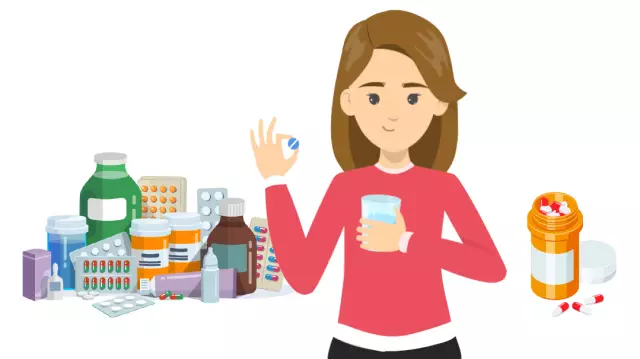- Author Rachel Wainwright [email protected].
- Public 2023-12-15 07:39.
- Last modified 2025-11-02 20:14.
Popular myths about antibiotics
For a long time, antibiotics were considered a panacea for all diseases and were prescribed even with minor signs of infection. Even now, not everyone knows what the power of antibiotics is, how and when they should be taken. Let's debunk 7 popular myths about such drugs.

Myth # 1: All medicines are antibiotics
Often, antibiotics are mistakenly called all antimicrobial agents, including sulfonamides. But this is not so, sulfonamides are completely synthetic drugs, their principle of action on bacteria and on the body is completely different from antibiotics.
Myth # 2: Antibiotics can be taken for prevention
Antibiotics attack the bacteria when they are there. If you take such drugs in their absence to a healthy person, nothing but side effects should be expected.
Myth # 3: Antibiotics can be taken from time to time
With this approach, it will not be possible to achieve the optimal concentration of the substance in the body, therefore, the effect of the drug will be insignificant and it will be able to cope only with the weakest microorganisms. The rest will begin to adapt, and thus the bacteria develop resistance to the active substance.
Therefore, it is extremely important to strictly observe the regimen, the duration of the course and the dosage of the drug, since with an insufficient amount of the active substance, the bacteria acquire immunity, and if taken too long, side effects and an allergic reaction may occur.
Myth # 4: When choosing antibiotics, it is better to rely on feedback from friends than on doctor's recommendations
This is an extremely wrong opinion. The same symptoms can be in completely different diseases, and with this approach you will only waste time, money, start the disease and create an extra burden on the liver.
Myth # 5: If you have an infection, you should always take antibiotics
Antibiotics work only on bacteria, and if the cause of the disease is viruses or fungi, treatment with such drugs will not bring any result. Therefore, with flu, acute respiratory infections and acute respiratory viral infections, antibiotics are prescribed only if the disease has passed into a bacterial form. In addition, antibiotics are far from the most harmless and harmless drugs, and to start taking them you need a really serious reason.
Myth # 6: You can stop taking antibiotics if you get better
In no case should you refuse to take antibiotics, even if you "recovered" already on the second or third day after you start taking it. If the course is interrupted, the disease may resume, and the same drugs will no longer help, since the bacteria already have resistance to them.
Myth # 7: An expensive antibiotic is always more effective than a cheap analog
The cost of a drug depends on many factors and is not always an indicator of quality, therefore it is better to focus on the composition and concentration of the active substance in the drug, and not on the well-known name.

In order not foolishly not to leave a large amount of money in the pharmacy and not harm your health, always study the information about a specific drug. All the necessary information about the manufacturer, instructions for use, contraindications, indications, dosage and other valuable information can be found on a special resource for pharmacists - the electronic reference book GEOTAR https://www.lsgeotar.ru/. It is enough just to drive the name of the drug into the search line and select the one you need from the list. Remember that antibiotics and other serious medications should be taken after consulting your doctor or pharmacist. You should not blindly believe advertising and be guided by the advice of friends, such a negligent attitude to health can turn into disastrous consequences. Take care of yourself and be healthy!
Found a mistake in the text? Select it and press Ctrl + Enter.






